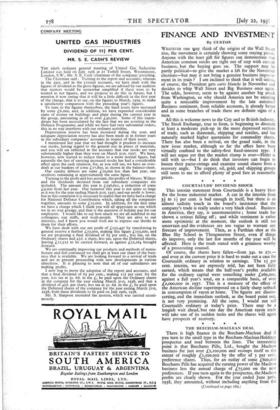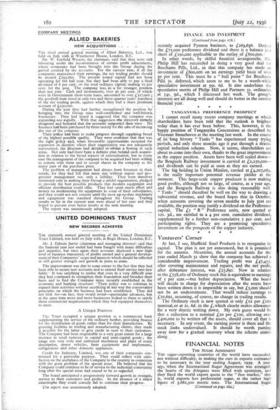FINANCE AND INVESTMENT
By CUSTOS
WHATEVER one way think of the origins of the Wall Street rise, the movement is certainly showing some staying power. Anyone with the least gift for figures can demonstrate that American common stocks are right out of step with current business, but the buying goes on. The support may be partly political—to give the market a lift for the November elections—but may it not bring a genuine business improve- ment in its train ? I am inclined to think that it will unless, of course, the President gets carte blanche in November and decides to whip Wall Street and Big Business once again. The odds, however, seem to be against another big attack from Washington, so why should America not be enjoying quite a noticeable improvement by the late autumn ? Business sentiment, from reliable accounts, is already better and in some branches of trade there are definite signs of a turn.
* * * * COURTAULDS' DIVIDEND SHOCK
This interim statement from Courtaulds is a heavy blow for the home industrial market. A cut in the interim from 34 to, xi per cent. is bad enough in itself, but there is an almost sadistic touch in the board's insistence that the company's trade is really under a very black cloud. Business in America, they say, is unremunerative ; home trade has shown a serious falling off ; and while sentiment is rather more optimistic at the moment, the outlook is still too uncertain and the evidences are too vague to warrant any forecast of improvement. Then, as a Parthian shot at. the Blue Sky School in Throgmorton Street, even if things do improve, only the last few months of the year will be affected. Here is the truth stated with a grimness worthy of a prosecuting counsel.
Of course, the shares have fallen—from 34s. to 27s.— and even at le current price it is hard to make out a case for Courtaulds ordinary in relation to earnings. The if per cent. interim, we are expressly told; has not been fully earned, which means that the half-year's profits available for the ordinary capital were something under £26o,000, against a full year's total, on a comparable basis, of over k2,000,000 in 1937. This is a measure of the effect of the American decline superimposed on a fairly sharp setback in consumption of rayon at home. The figures are discon- certing, and the immediate outlook, as the board point out, is not very promising. All the same, I would not sell Courtaulds ordinary at today's price. There may be a longish wait ahead, but one day the American rayon trade will take one of its sudden turns and the shares will again have prospects of recovery. * * * *
THE BEECHAM-MACLEAN DEAL
There is high finance in the Beecham-Maclean deal if you turn to the small type in the Beeaham-Maclean Holdings prospectus and read between the lines. The interesting point is that Beechams Pills, Ltd., bought the Maclean business for just over £2,100,000 and recoups itself to the extent of roughly £1,5oo,000 by the offer of 5 per cent. preference shares. Thus, for an outlay of some L6o0,000 Beechams Pills has acquired the earning power of the Maclean business less the annual charge of. £75,000 on the new preferences. If you turn again to the prospectus, the Maclean profits are clearly shown. Far the year ended June 3oth, 1938, they amounted, without including anything from the
(Continued on page •180.)
All this is welcome news to the City and to British industry. The Stock Exchange, true to form, is beginning to discount at least a moderate pick-up in the more depressed sections of trade, such as diamonds, shipping and textiles, and has naturally marked higher quotations for commodity shares. There has also been a revival, on the grand scale, in the new issue market, although so far the offers have been virtually confined to the safety-first fixed-interest type. I will not argue yet that the market slump is over—Hitler is still with us—but I do think that investors can begin to loosen their purse-strings and examine sound shares from a recovery. angle. The copper, oil, gold, and shipping groups still seem to me to afford plenty of good fare at reasonable prices.
FINANCE AND INVESTMENT
(Continued from page 178.) recently acquired Fynnon business, to £263,636. Deduct the k75,000 preference dividend and there is a balance just short of £190,000 applicable to the outlay. of £600,00o. In other words, by skilful financial arrangement, Mr. Philip Hill has succeeded in doing a very good deal for BeedianiS Pills, Ltd.,.-in That this company has made, an investment of £600,00b on -an earnings yield basis of Over 3o per cent. This must be a " bull point " for Beechams Pills 5s. deferred, which seem to me to be a worth-while speculative investment at 59s. 6d. It also underlines the speculative-merits of Philip Hill and Partners 5s. ordinaries at 9d.,. which I discussed last week. The group's interests are all doing well and should do better in the current financial Year. .
* * * * 7 • •
TANGANYIKA PREFERENCE PROSPECT
I cannot recall many recent company meetings at which shareholdira have. heen told that the outlook is brighter today-than- it has ever been before. This, howeVer, is the happy position of .Tanganyika Concessions as described by Viscount Stonthatien at the meeting last week. In the course of iii"lOng- history "Tanks " has 'experienced many trying periods, and only three months ago it put through a drastic capital reduction scheme Now, it seems, shareholders are about to come into their own, thanks to the great improVeinent in the copper position. Assets have been well scaled down— the Benguela Railway investment is carried at £2,250,000-- , and dividends can be paid* as -soon as they are earned. The big holdingi in Union Miniere;Carried at £4,207,089, is the really important potential revenue yielder at the - moment. This large-scale copper producer is now making good profits, although not so large, of course, as a year ago, and the Benguela Railway is - also doing reasonably well. "' Tanks " should therefore' be well on the way to drawing a substantial revenue, and the board hopes that in October, when accounts covering the seven months to July -31st are available, the position may justify a dividend on the Preference capital. The Lr " B ", Preference units, now quoted at I2S. 3d-., are entitled to a 4 per cent. Cumulative dividend, supplemented by a further,non-cumulative 2 per cent. and participating rights.. They are a promising .speculative investment on the prospects of the Copper industry.' * * * * Venturers' Corner At last, I see, Sheffield Steel Products is to reorganise its capital. The plan is not yet announced, but it is promised for the autumn. Meantime, the annual accounts for the year ended March 31 show that the company has achieved a considerable improvement. Trading profit was L47,455 after covering -maintenance and repairs; and -the net profit; after debenture interest, was L'25,691.• Now in relation t6 the £558,262 of Ordinary stock this is equivalent to earnings. of 5 per cent. —but before depreciation. What the board. will decide to charge for depreciation after the assets have- been written -down it is impossible to say, but k5,doo'Should not be an. Underestimate. That `would redute earnings to £20,691, assuming, of course, no change in trading results.
" The Ordinary stock is now quoted at only kr-2 per• kroo nominal, or -at 2S. 6d. .in- the which clearly makes- allowance for a very drastic writing down. My own guess would be that a reduction to -a nominal £20 per ,Croo, allowing over k400,000 to be written off the assets,. should cover all that is ce nessary.' 'In any event, the earning-power is there and 'the stock looks undervalued. It should .be worth--putting away now- for'a gradual recovery- when the SClierne conies along.












































 Previous page
Previous page